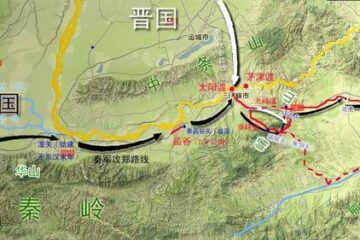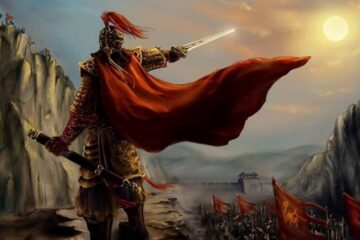If the world had remained peaceful, Xian Zhen’s military talent might have been buried and forgotten. However, it was impossible for the world to stay peaceful because this was the tumultuous era of the Spring and Autumn Period.
The term “Spring and Autumn Period” referred to the chaotic times when people were constantly stirring up trouble, and these troublemakers were known as “barbarians” during that era.
It’s strange, isn’t it? Despite living on the same land, people in ancient China were divided into two groups: “Huaxia” and “barbarians.” These two concepts are difficult to explain, but to put it simply, “Huaxia” adhered to Zhou culture, recognized the Zhou king as the paramount ruler, and followed the Zhou Dynasty etiquette as the orthodox ideology. On the other hand, the “barbarians” had their own unique cultures and did not acknowledge the Zhou king’s authority, dismissing the Zhou Dynasty etiquette as worthless.
The largest and most powerful “barbarian” state was the Chu Kingdom, known as the “Southern Barbarians.”
At that time, the Chu Kingdom was vast, stretching across thousands of miles and almost entirely wiping out the “Huaxia” states in the Yangtze and Huai River basins. To the “Huaxia” people, it was unbearable that the Chu people have their own king, acting as if they were on equal footing with the Zhou royal family.
This was intolerable; there could only be one king in the world, and that was the Zhou king. How could the Chu people also claim kingship and try to replace the Zhou?
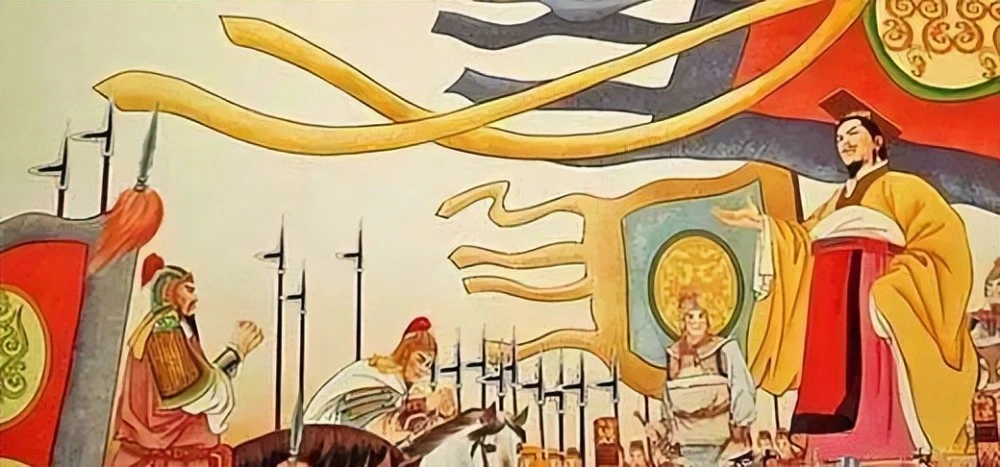
In theory, this was the moment for the Zhou king to step forward, unite the “Huaxia” states, and confront the “Southern Barbarians.” However, ever since King Ping of Zhou moved the capital to Luo Yi, the Zhou king had lost his former authority and gradually declined to the status of a secondary vassal. He could barely protect himself, let alone lead everyone to deal with the increasingly arrogant Chu Kingdom.
With a weak Zhou kingdom, the various states in the Central Plains were fragmented, and the “Huaxia” people faced the most dangerous situation!
The Spring and Autumn Period called for a true overlord to rule the world!
At that time, the international situation had reached a boiling point, and the Chu Kingdom, under the leadership of the formidable King Cheng of Chu, with his invincible Chu army, was heading north, and wherever they went, the “Huaxia” small states surrendered and submitted. Even when the principled Duke Xiang of Song resisted, he was still defeated and forced to surrender. By 633 BCE, from south to north, the small “Huaxia” states of Cai, Chen, Xu, Zheng, Cao, Lu, and Wei had all submitted to Chu. The Chu Kingdom’s influence extended from the Yangtze River basin all the way to the Yellow River, and once the last resilient state of Song (located in present-day Shangqiu, Henan) was subdued, Chu could directly invade the territories of the two major powers, Qi and Jin, and cause trouble.
As for the Qi Kingdom, with the demise of its great ruler, Duke Huan of Qi, it had fallen into even worse internal strife than the former Jin Kingdom. It was utterly unable to resist the mighty Chu. In fact, Chu’s formidable power was closely related to the mistake made by Duke Huan of Qi, who had failed to confront Chu earlier. Duke Huan’s lack of military determination had allowed Chu to grow stronger unchecked, leading to the current irreparable situation.
The barbarian influence of Chu spread throughout the Central Plains, and the “Huaxia” clans faced their most dangerous moment!
In the chaotic times of the Spring and Autumn Period, the call for a true overlord to emerge and rule the world was resounding!!

This formidable historical task ultimately fell on the shoulders of two close friends, Duke Wen of Jin and Xian Zhen.
In 633 BCE, King Cheng of Chu led the forces of Zheng, Xu, Chen, Cai, and other “Huaxia” vassals to besiege the state of Song. Overwhelmed by the attack, Song had no choice but to seek aid from Jin, a powerful and respected state. This was a clear sign of acknowledging Jin as the potential overlord of the Central Plains. Duke Wen faced a critical decision. If he defeated Chu, he could inherit the position of paramount ruler like Duke Huan of Qi had done before. However, if he hesitated, it would only embolden the Chu Kingdom, forcing Jin to accept a subordinate status or possibly face future invasions from Chu.
Facing this historic choice, Xian Zhen resolutely stepped forward and said to Duke Wen, “Chu’s attack on Song is a disaster for the Central Plains. This is heaven’s gift to us to relieve distress and aid the suffering. Seizing power and establishing dominance lies in this decisive action!”
Duke Wen hesitated. He certainly desired to become an overlord, but there were challenges. The states of Cao and Wei were situated between Jin and Song, and launching an expedition would expose his troops to potential attacks from the flanks. Moreover, Chu had a formidable army, and winning a direct confrontation was uncertain and challenging.
Xian Zhen smiled and said, “This is an easy task. Why not raise troops to attack Cao and Wei? Chu will be forced to come to their aid, and then the siege of Song will be loosened.”
Indeed, Cao and Wei were recently conquered vassals of Chu. If Chu ignored their plight, its accumulated prestige in the Central Plains would be undermined, and its grand ambition to invade the Central Plains would be shattered. This strategy was akin to “You attack my little brother, and I will attack yours.”
In summary, this plan was brilliant. Xian Zhen, the founding master of Chinese military strategy, later developed and named it “Wei Wei Jiu Zhao,” which became renowned in Chinese military history. Unfortunately, few people know that the original creator of this strategy was Xian Zhen himself!
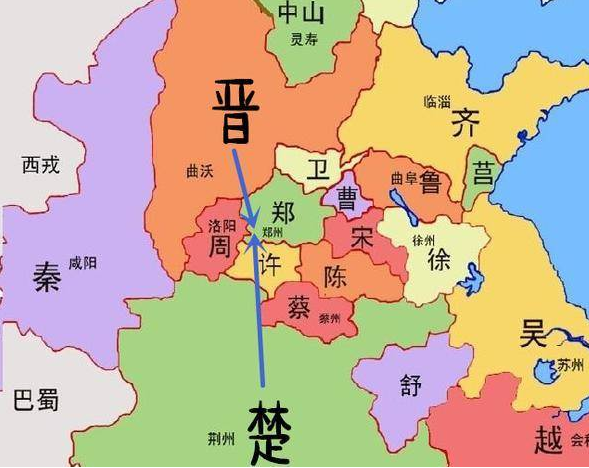
Duke Wen was hesitant about confronting Chu, but he didn’t even consider the two lesser states of Cao and Wei. With determination, he mobilized his forces and launched an attack on Wulu, a city in Wei (present-day northwest Henan). Leading this military campaign was Xian Zhen, the rising star of Jin’s military, who was about to shine brightly in the dawn of history.
The Battle of Wulü marked Jin’s first major engagement in its quest for dominance. There was no room for failure, and the victory had to be swift, as Jin’s expedition couldn’t afford a defeat or prolonged engagement. Therefore, Xian Zhen decided to employ a tactic similar to the Blitzkrieg used by the German forces in World War II—hit-and-run warfare!
Step one, seize the initiative. Xian Zhen led his troops on a detour to the south of the Yellow River. When no one expected it, he rapidly crossed the Yellow River and swiftly approached the walls of Wulu City. The speed of his march was beyond imagination, catching the defending troops of Wei off guard and plunging them into panic.
Step two, create a frightening atmosphere. Xian Zhen ordered his men to fill the mountains around the city with military flags, creating an illusion of a formidable enemy force and an unwavering determination to achieve victory at all costs. This tactic shattered the stubborn resistance of the Wei defenders. They were terrified by the countless flags covering the hills and scattered in a panic. Without expending a single soldier, Xian Zhen easily captured Wulu City.
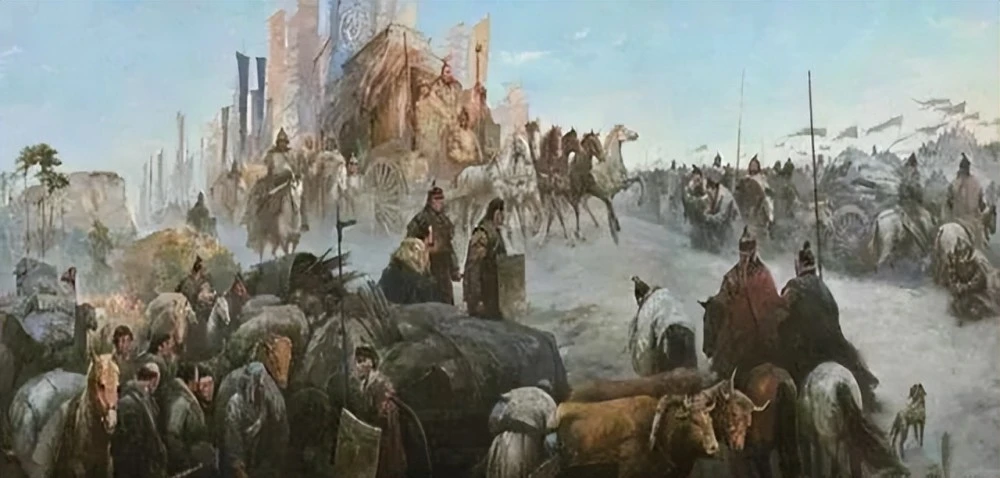
It was all that simple.
The rising star of the new generation had made his debut with such a resounding success. This was the true strength of Xian Zhen, and everyone, including Duke Wen of Jin, began to reevaluate this military genius.
Coincidentally, it was at this moment that the leader of the central army, Xie Gu, suddenly passed away.
His death provided the perfect opportunity for Xian Zhen to rise to a higher position. Duke Wen immediately promoted Xian Zhen by six ranks, appointing him as the leader of the central army, in command of the entire military.

